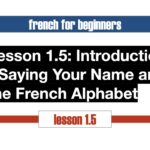Lesson 12: Review and Basic Conversation in French
Review of Previous Lessons:
In this lesson, we will review the key concepts and vocabulary covered in the previous lessons. This review will help reinforce your understanding of French basics.
Greetings and Phrases:
| Français | Prononciation en anglais | Anglais |
|---|---|---|
| Bonjour | [bon-zhoor] | Hello |
| Bonsoir | [bon-swahr] | Good evening |
| Bonne nuit | [bon nwee] | Good night |
| Salut | [sa-loo] | Hi |
| Comment ça va ? | [kom-mawn sah vah] | How are you? |
| Ça va bien | [sah vah byan] | I’m fine |
| Merci | [mair-see] | Thank you |
| S’il vous plaît | [seel voo pleh] | Please |
| Excusez-moi | [ex-kew-zay mwah] | Excuse me |
| Au revoir | [oh ruh-vwar] | Goodbye |
Numbers:
- Numbers from 1 to 20
| Français | Prononciation en anglais | Anglais |
|---|---|---|
| 1 (un) | [uh] | One |
| 2 (deux) | [duh] | Two |
| 3 (trois) | [twa] | Three |
| 4 (quatre) | [katruh] | Four |
| 5 (cinq) | [sank] | Five |
| 6 (six) | [sees] | Six |
| 7 (sept) | [sept] | Seven |
| 8 (huit) | [wheet] | Eight |
| 9 (neuf) | [nuhf] | Nine |
| 10 (dix) | [dees] | Ten |
| 11 (onze) | [onz] | Eleven |
| 12 (douze) | [dooz] | Twelve |
| 13 (treize) | [trez] | Thirteen |
| 14 (quatorze) | [katohrz] | Fourteen |
| 15 (quinze) | [keenz] | Fifteen |
| 16 (seize) | [sehz] | Sixteen |
| 17 (dix-sept) | [dees sept] | Seventeen |
| 18 (dix-huit) | [dees wheet] | Eighteen |
| 19 (dix-neuf) | [dees nuhf] | Nineteen |
| 20 (vingt) | [vahn] | Twenty |
Listen and fill in the missing number.
Days of the Week and Months of the Year:
- Days of the week (e.g., lundi, mardi, mercredi, jeudi, vendredi, samedi, dimanche)
- Months of the year (e.g., janvier, février, mars, avril, mai, juin, juillet, août, septembre, octobre, novembre, décembre)
Personal Pronouns:
| French Subject Pronouns | English Translation |
|---|---|
| je | I |
| tu | You (singular, informal) |
| il / elle / on | He/She/One |
| nous | We |
| vous | You (plural, formal) |
| ils / elles | They (masculine/feminine) |
Verbs:
- The verb “être” (to be)
- The verb “avoir” (to have)
- Regular Verbs Ending in “-er” and Pronunciation Tips
Articles:
- Definite and indefinite articles (e.g., le, la, les, un, une, des)
Adjectives:
- Basic colors and adjectives
- Adjective position
Simple Interrogative Sentences:
- Asking yes/no questions (e.g., Est-ce que tu aimes le chocolat ?)
Simple Negative Sentences:
- Forming negative sentences (e.g., Je n’aime pas les légumes.)
Basic Conversation Practice:
Let’s engage in some basic conversation practice to apply what we’ve learned. Feel free to use the phrases and vocabulary from the previous lessons to have a simple conversation.
Example Conversation:
Example Conversation 1: Greetings 1/2
- Person A: Bonjour !
- Person B: Bonjour ! Comment ça va ?
- Person A: Ça va bien, merci. Et toi ?
- Person B: Ça va bien aussi. Bonne journée !
- Person A: Merci, toi aussi !
Example Conversation 2: Greetings 2/2
— Person A: Bonjour ! Comment ça va ?
— Person B: Bonjour ! Ça va bien, merci. Et toi ?
— Person A: Ça va bien aussi, merci.
— Person B: Au revoir !
— Person A: Au revoir !
Example Conversation 3: Ordering Food
— Person A: Bonsoir, une pizza margherita, s’il vous plaît.
— Person B: D’accord. Une pizza margherita. Vous désirez une boisson ?
— Person A: Un verre de vin rouge, s’il vous plaît.
— Person B: Parfait. Une pizza margherita et un verre de vin rouge.
— Person A: Oui, merci.
Example Conversation 4: Talking About the Weather
— Person A: Il fait beau aujourd’hui…
— Person B: Oui, le soleil brille. C’est agréable.
— Person A: Oui, c’est vraiment agréable.
— Person B: C’est parfait pour une promenade.
— Person A: Absolument !
Example Conversation 5: Planning an Event
— Person A: Salut ! Est-ce que tu viens à la fête samedi prochain ?
— Person B: Oui, je serai là. La fête commence à quelle heure ?
— Person A: À 20 heures.
— Person B: Merci.
Homework:
Your homework for this lesson is to have a short conversation in French with a friend or partner. Use the greetings, phrases, and questions you’ve learned in this review. Practice makes perfect!
In the next lesson, we will start exploring more advanced topics in the French language. Congratulations on completing the basics!
Remember to review and practice regularly to reinforce your French language skills. Bonne chance! (Good luck!)

